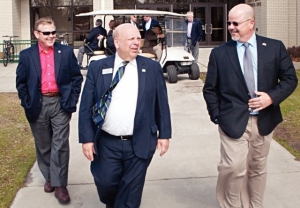MOC officials explain goals, plans to county commission
By Steve Herring
Published in News on March 3, 2013 1:50 AM

News-Argus/STEVE HERRING
Mount Olive College Dr. Philip Kerstetter, center, talks with Wayne County Commissioners Joe Daughtery, left, and Bill Pate during a tour last week of the college campus. MOC hosted the commissioners to talk about the college's $20 million capital campaign, a possible downtown presence, the addition of graduate degree programs and a goal of 1,100 on-campus traditional students.
MOUNT OLIVE -- A $20 million capital campaign is under way at Mount Olive College, with the money to be used for renovations and new buildings on the campus, as well as a possible downtown presence for the college.
Complementing that vision is the planned addition of graduate degree programs and a goal of 1,100 on-campus traditional students.
However, the impact of those changes won't be limited to the campus, MOC President Dr. Philip Kerstetter told the Wayne County commissioners during their Thursday visit.
The commissioners were invited to the college for a presentation on the college's impact on the county and Mount Olive, as well as a campus tour.
"Our purpose today is to show you how far Mount Olive College has come since 1954 when Dr. (Burkette) Raper opened the college in the (old) Mount Olive Elementary School with 22 students," said George Kornegay, chairman of the Mount Olive College Foundation.
Raper, who dedicated his life to the college, grew the institution from two-year to four-year status in 1986, Kornegay said. Following in his footsteps in the president's job were Dr. Bill Byrd, a Mount Olive native, and now Kerstetter, each of whom has brought a different perspective and vision for the college.
But the bottom line for all, and the college's goal now, is to continue to improve and grow the quality of the education MOC students receive, and to move forward with plans to expand the college's reach and offerings.
There to represent that mission were members of the college faculty -- all of whom emphasized the personal attention offered MOC students, as well as the success of the programs they are studying, adding that in many cases, students are moving right into full-time employment or further education in their fields.
For example, recognizing the importance of agriculture, MOC offers a four-year degree in agribusiness and agriculture education -- a program normally associated with land grant universities like N.C. State University, said Dr. Sandy Maddox, director of the college's agribusiness center.
"Our agricultural students make up almost 10 percent of the traditional body," she said.
Ms. Maddox said that 100 percent of the program's first graduating class of 2005, most of whom are from eastern North Carolina, are employed -- 90 percent in eastern North Carolina.
"So I think that Mount Olive College is doing something very unique in giving back to the communities in which these young people came from," she said.
It was a success story repeated by other department heads from the sciences to education.
The liberal arts college tradition allows MOC to prepare students not only for careers, but for life, Kerstetter said. Courses provide a foundation for effective writing, communication and problem solving, critical thinking, understanding human behavior and developing a strong work ethic.
And the college has an economic footprint as well.
"We think we are serving this region," Kerstetter said. "To put this in perspective, my estimate in terms of our impact on North Carolina is about $100 million annually."
In the mid-1970s, the college added classes at Seymour Johnson Air Force Base and has since grown to a total of seven locations in eastern North Carolina, serving about 3,500 students per semester including nearly 900 traditional students on the campus last fall.
"We are geographically distributed enough so that everybody has access to higher education," Kerstetter said. "We have developed a non-traditional program to allow adult students to come one night a week and concentrate on getting their classes done as they are juggling family, jobs, finances, academics."
Like any business, the college faces certain pressures, including the need for revenues to exceed expenditures. As a nonprofit, any excess goes back into the college.
And as far as the future goes, Kerstetter said the college is focused not only on improving the experience for its students, but expanding its reach and vision -- just as its founders and leaders have over the years.
"Where do we see ourselves going?" he said. "We have dreams just as Burkette and the people who had those visions before. We have dreams as well."
But the college's first mission will remain, he said, providing a quality education for its students.
"They are why we are here," he said.
